As we step into 2025, artificial intelligence continues to reshape our world at an unprecedented pace. From revolutionizing healthcare to transforming how we work and communicate, AI is no longer a futuristic concept—it's our present reality.
AI in Healthcare: Saving Lives Through Intelligence
The healthcare sector is experiencing a revolutionary transformation through AI integration. Machine learning algorithms are now capable of detecting diseases earlier and more accurately than traditional methods. In 2025, we're seeing AI systems that can:
- Diagnose cancer from medical imaging with 95% accuracy
- Predict patient deterioration hours before symptoms appear
- Personalize treatment plans based on genetic profiles
- Accelerate drug discovery from decades to months
Dr. Sarah Chen, a leading AI researcher at Stanford Medical Center, notes: "We're witnessing the democratization of expert medical knowledge. AI is making world-class diagnostic capabilities available in remote areas where specialist doctors are scarce."
The Workplace Revolution
The integration of AI in the workplace is creating new opportunities while transforming existing roles. Rather than replacing humans entirely, AI is augmenting human capabilities and creating new job categories:
Emerging AI-Related Careers
- AI Trainers: Professionals who teach AI systems to understand human behavior and preferences
- Algorithm Auditors: Specialists who ensure AI systems operate fairly and without bias
- Human-AI Interaction Designers: Experts who create seamless interfaces between humans and AI systems
AI in Education: Personalized Learning at Scale
Educational institutions are leveraging AI to create personalized learning experiences. Adaptive learning platforms now adjust content difficulty in real-time based on student performance, ensuring optimal learning outcomes for each individual.
Key developments include:
- AI tutors providing 24/7 personalized assistance
- Automated essay grading with detailed feedback
- Predictive analytics identifying students at risk of dropping out
- Language learning apps that adapt to individual learning styles
Ethical Considerations and Challenges
As AI becomes more prevalent, addressing ethical concerns becomes crucial. The AI community is actively working on:
Bias Mitigation
Ensuring AI systems don't perpetuate or amplify existing societal biases. This involves diverse training data, inclusive development teams, and continuous monitoring of AI outputs.
Privacy Protection
Developing AI systems that can learn and improve while protecting individual privacy through techniques like federated learning and differential privacy.
Transparency and Explainability
Creating AI systems that can explain their decision-making processes, especially in critical applications like healthcare and criminal justice.
Consumer AI: Making Life Easier
In 2025, AI assistants have evolved beyond simple voice commands. They now understand context, emotion, and can handle complex multi-step tasks:
- Smart home systems that anticipate needs and adjust environments automatically
- AI-powered financial advisors providing personalized investment strategies
- Intelligent travel assistants that plan entire trips based on preferences and budget
- Health monitoring systems that provide early warnings and lifestyle recommendations
The Road Ahead: Predictions for Late 2025
Looking toward the latter half of 2025, several trends are emerging:
Multimodal AI
AI systems that can seamlessly process and understand text, images, audio, and video simultaneously, creating more natural and intuitive interactions.
Edge AI
More AI processing happening directly on devices rather than in the cloud, improving speed, privacy, and reducing dependence on internet connectivity.
AI Democratization
No-code AI platforms enabling non-technical users to create and deploy AI solutions for their specific needs.
Preparing for an AI-Driven Future
To thrive in this AI-enhanced world, individuals and organizations should:
- Embrace Continuous Learning: Stay updated with AI developments and their implications for your field
- Develop AI Literacy: Understand how AI works, its capabilities, and limitations
- Focus on Human Skills: Cultivate creativity, emotional intelligence, and critical thinking—skills that complement AI
- Consider Ethical Implications: Think about the responsible use of AI in your personal and professional life
Conclusion
The future of AI in 2025 is not about human versus machine—it's about human with machine. As AI continues to evolve, our success will depend on how well we can collaborate with these intelligent systems to solve complex problems and improve quality of life.
The key is to remain adaptable, curious, and committed to using AI as a tool for positive change. The future is not predetermined; it's being shaped by the choices we make today about how we develop, deploy, and interact with artificial intelligence.
As we navigate this exciting frontier, one thing is certain: AI will continue to surprise us with its capabilities while challenging us to think more deeply about what it means to be human in an increasingly intelligent world.
